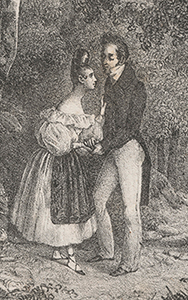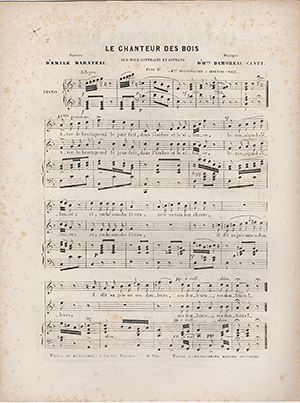 La sincère : ballade
The salon was an important venue for the patronage, performance, and circulation of music. As an institution that initially flourished under the ancien régime, the salon typically brought together leading political and intellectual figures for conversation and debate about cultural, literary, and philosophical matters. Women played a central role as salonnières (salon hostesses), a position that required considerable wealth, influence, and education. Even as the institution slipped from the exclusive purview of the aristocracy during the July Monarchy (1830–1848), which instituted a constitutional monarchy under the “citizen king,” Louis-Philippe, salons continued to flourish through to the end of the century.
La sincère : ballade
The salon was an important venue for the patronage, performance, and circulation of music. As an institution that initially flourished under the ancien régime, the salon typically brought together leading political and intellectual figures for conversation and debate about cultural, literary, and philosophical matters. Women played a central role as salonnières (salon hostesses), a position that required considerable wealth, influence, and education. Even as the institution slipped from the exclusive purview of the aristocracy during the July Monarchy (1830–1848), which instituted a constitutional monarchy under the “citizen king,” Louis-Philippe, salons continued to flourish through to the end of the century.
In 1846, there were 850 “musical interludes” at Parisian salons substantial enough to be considered private concerts. Music occupied a central role, particularly with the influence of musicians such as Chopin, who privileged the salon’s intimacy and exclusivity over public concerts and cultivated genres suited to the venue: études, nocturnes, and mazurkas. The programming varied according to the host’s taste and politics, the setting, and the guests. Princess Cristina Belgiojoso, a noblewoman who fled to Paris after the failed insurrections in Italy, hosted the 1837 benefit for Italian exiles, which included the famous duel between Liszt and Thalberg. Many important works of the 1830s were performed at Marie d’Agoult’s salon—Berlioz’s Symphonie fantastique, arranged for piano by Liszt, Chopin’s mazurkas, Hiller’s études, Schubert’s lieder sung in French by tenor Adolphe Nourrit—in addition to operatic excerpts, harp and guitar music, and romances. At Offenbach’s “vendredis de Jacques” at mid century, guests were entertained by burlesques and parodies of grand opéra.
 Le chanteur des bois : duo pour contralto et sopranoThe salon straddled the public and private worlds. “Salon music” comprised a variety of genres that could be heard at once on the public concert stage, at the theatre, and in the home. Music composed for private or domestic purposes could have political influence and historical significance. Mary Ann Smart (2010) has shown how Rossini’s Soirées musicales and Mercadante’s Soirées italiennes, song cycles with poetry by Count Carlo Pepoli that contain allusions to Bellini’s I puritani and potentially fostered favourable attitudes toward Italian unification, were not only sung in Parisian salons but also distributed to a wider public via sheet music. Salons contributed significantly to the promotion and patronage of composers and performers by helping to launch their professional careers, and cultivated a dynamic and engaged musical public.
Le chanteur des bois : duo pour contralto et sopranoThe salon straddled the public and private worlds. “Salon music” comprised a variety of genres that could be heard at once on the public concert stage, at the theatre, and in the home. Music composed for private or domestic purposes could have political influence and historical significance. Mary Ann Smart (2010) has shown how Rossini’s Soirées musicales and Mercadante’s Soirées italiennes, song cycles with poetry by Count Carlo Pepoli that contain allusions to Bellini’s I puritani and potentially fostered favourable attitudes toward Italian unification, were not only sung in Parisian salons but also distributed to a wider public via sheet music. Salons contributed significantly to the promotion and patronage of composers and performers by helping to launch their professional careers, and cultivated a dynamic and engaged musical public.
Agoult, Marie de Flavigny. Mes souvenirs, 1806–1833. 3rd ed. Paris: Calmann Lévy, 1880.
Atwood, William G. The Parisian Worlds of Frédéric Chopin. New Haven: Yale University Press, 1999.
Brooks, Jeanice. “Nadia Boulanger and the Salon of the Princesse de Polignac.” Journal of the American Musicological Society 46, no. 3 (Fall 1993): 415–68.
Dahlhaus, Carl. Nineteenth-Century Music. Translated by J. Bradford Robinson. Berkeley: University of California Press, 1989.
Leung-Wolf, Elaine.“Women, Music, and the Salon Tradition: Its Cultural and Historical Significance in Parisian Musical Society.” DMA thesis, University of Cincinnati, 1996.
Ross, James. “Music in the French Salon.” In French Music Since Berlioz, edited by Richard Langham Smith and Caroline Potter, 91–115. Aldershot: Ashgate, 2006.

